 Image courtesy of Ambro at FreeDigitalPhotos.net Image courtesy of Ambro at FreeDigitalPhotos.net Contractors are always complaining that they can’t find skilled people. We often hear complaints like: “You can’t find good people anymore”, or “None of these youngsters want to work these days”, or “I have a problem with my staff stealing”, or “My workers are so unreliable”, or “I can’t find skilled people” and more. I’m sure you’ve heard all the complaints, maybe you’ve even said some of these things. Of course sometimes they are true, although often they are generalisations and it’s only a few bad individuals. Yet, many contractors and construction project managers have a set idea on who is employable in construction. Probably, ideally the person should have experience, they should be fit and healthy, probably young, and even in many cases a male. But are these always essential characteristics? Are we excluding many in this employment process that perhaps may be suitable? What we do know however is that we are including people who don’t always prove to be suitable. I was fortunate to be born with no physical or mental disabilities. I was even more fortunate to come from a stable home where I had good influences and I was able to attend good schools. Yet, despite this good luck I’m sure I have my faults and shortcomings, and I’m sure I’ve messed up some opportunities and made a mess of a few things in my life. Of course not everyone is as fortunate. By a stroke of bad luck something goes wrong with a person’s genes, or something influences development of the embryo, or there’s a problem during birth and the person has a mental or physical disability. These disabilities can range from relatively mild or even benign issues, to major problems that radically impact the person’s mobility and speech. Unfortunately even those born without a disability can be impacted later in life. Some fall in with the wrong crowd, even serving prison time. Veterans suffer stress and trauma during active service. Motor vehicle accidents can change a person’s life in an instant. People suffer sickness which can drain them physically and financially. Life can be tough for some people. So let’s look at construction employment practices in a bit more detail.Firstly, those without construction experience are excluded. But where did we all start our construction careers – at the bottom when we had no experience. Some contractor put the time and trouble into training us and I think we mostly rewarded them for their efforts. Yet, many contractors are loath to train and mentor unskilled recruits, choosing rather to search for people in a shrinking skills pool. Yet, paradoxically often older experienced people are excluded in the recruitment process. “He is too old”, or “He is too skilled for the job”, or “He is going to want too much money”. Why – how do you know these things? Why should contractors exclude an older experienced person? Surely if they are capable of doing the job we should be welcoming them? Women are often excluded from construction jobs. Excuses include: “They’ll be unreliable”, or “They aren’t strong enough”, or “We will require additional toilets”, or “They’ll be a distraction on the project” or “They’ll always be talking”. So there we go excluding 50% of the population before we even start looking for people! Is every woman unsuitable for construction? Is every construction role unsuitable for a woman? Some construction companies wouldn’t think to hire a homeless person. Just because they don’t have a place to call home and look dirty and dishevelled does not mean that they are on drugs, they drink excessively, they steal or that they’re lazy. Perhaps some are, but then some of the supposed ‘normal’ people that contractors hire are no different! Regrettably there are many who have suffered hardship or illness and have ended up losing their home, ending up on the streets. Some have been without a job for years. Is this reason not to employ them? Then what about a disabled person. “Oh we can’t employ a disable person in construction it’s too dangerous”. Well not every disability is the same and not every job on a construction project demands the same skills. Many years ago we employed a person with a mental disability on a construction project. He walked a bit awkwardly, he was obviously a little slow mentally. He was desperate for a job and had been rejected by multiple companies. My construction project manager gave him a job as a general worker, and he turned out to be one of our best workers. He never missed a day, he arrived on time, he worked hard, and in fact he became an inspiration for all the ‘normal’ workers in the team who often worked harder because they didn’t want to be shown up by a disabled person. Most importantly he was just so pleased to get a job that he was incredibly loyal to the project manager and the company. Now recently I watched a television program about disabled people and the problems they have finding a job. Far too often we judge people by their appearances, what’s written on a piece of paper, and usually by our own perceptions of what normal is. Yet, most of these people just want a job, they don’t want to be dependent on the government or others for support. They usually understand their limitations. Many of them are enthusiastic and willing to work hard – they just need someone to give them a chance. Sure most are never going to be a star performer, or reach stellar career heights. But, what they are going to offer a company is loyalty, commitment, honesty, hard work, even enthusiasm, and often we don’t need more than that. Then we have most companies who won’t hire ex-convicts. The excuses include: “Once a criminal always a criminal”, or “Our clients wouldn’t be happy to know we employ criminals”, or “We need honest people here”. Sure contractors do need honest employees – every company does. But, sometimes the people we hire who we thought were honest turn out to be dishonest! People do change and we’ve all done and said things in the past that we probably regret now. The justice system is there to both punish and reform people and the reform process isn’t going to work if the person can’t find an honest job after they’ve served their punishment. Sure, I’m not saying go out and employ every criminal on the street, I’m only saying be open to the idea of employing someone who has served time and who wants to change their life. Conclusion - improving employment practices in construction Many contractors have poor employment practices which leads them to employing the wrong people, or being unable to find people at all. We all discriminate in some manner, we all tend to pigeon hole people on their backgrounds, looks, race, age, gender, etc. But, in doing this are we excluding people who could fill a role perfectly on our construction project or elsewhere in the company? After all, what is the right person in construction? So here’s a challenge for all you construction project and company managers!When you start your next construction project, how about setting a goal to employ the following 6 people. Employ one person with a disability – physical or mental disability, it doesn’t matter. Employ one older person – someone over 50. Employ a homeless person. Employ a veteran. Employ at least one woman – and not in an office role. Employ at least one person who has no construction experience, someone that you plan to mentor and train. Of course if you can employ a homeless, disabled and elderly veteran, then all the better. I believe that you may be surprised, you may just find that you’ve employed a hardworking, reliable and loyal individual. What have you got to lose? How often have you employed an individual that you thought was just right for the role, only to have them let you down when they turned out to be lazy, unreliable or dishonest? Not everyone has been born lucky like most of us have been. Some have had tragedy, disability or a poor upbringing. Yet, many of these people aren’t looking for an excuse, they often understand their limitations, but all they are looking for is an opportunity to have a job and prove their worth. All they’re asking is a fair go. All we have to do is give them a fair chance, not just exclude them because of our prejudices, rather listen to them and see what they can offer your company and construction projects. Be open to new ideas and possibilities. Maybe even adjust and reorganise the construction project slightly. Of course the process requires buy in from the rest of the project team, who usually have their own preconceived ideas and prejudices. Everyone in the team needs to be open to giving new employees a fair opportunity. I believe that your construction company and projects will be well rewarded for your efforts. What successes have you had when employing a disabled person, perhaps a homeless person or an ex-convict? What are your thoughts on employing some of the people mentioned above? Please like and share this article. This article is adapted from information in the author’s popular books: 'Successful Construction Project Management: The Practical Guide' and 'Building a Successful Construction Company: The Practical Guide' and 'Construction Project Management: Tips and Insights'
'Construction Claims: A Short Guide for Contractors' is another of Paul's useful books. Paul has recently published 'Construction Management: From Project Concept to completion'. Paul's new book: 'The Successful Construction Supervisor and Foreman' has more valuable information for contractors. These books are available on Amazon and other online book stores. Paul publishes articles regularly on LinkedIn and his website. Paul writes regular articles for other websites, gives lectures, mentors, and is available for podcasts and interviews. Please like and share this article. © 2019 This article is not to be reproduced for commercial purposes without written permission from the author.
0 Comments
Can you start construction? You are about to start your construction project. The owner (or their project manager) hands you access to the work site. You are good to go – or are you? Unfortunately, contractors often accept possession of project construction sites, or construction work areas, and don’t check it. Only several weeks later do they discover that there’s a problem, they’re losing money, the construction work is going slower than expected, or something doesn’t fit. Only when they investigate do they discover that the problems originate because the work site given to them wasn’t in accordance with the construction project specifications and contract document. Often by then, it’s too late to complain. So next time you are handed access, or possession, to a work area or construction project site, make sure you check it properly before accepting handover. What you should check before starting construction.Before accepting handover of an area from the client/owner or their project manager it’s important to check the following:
Conclusion - avoiding problems on your construction project.....Continue Reading.... This article was first published on the ClockShark website. To visit this website and continue reading the article click on the link above. Please share this post 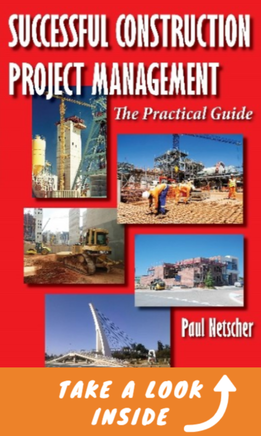 To read more about the author’s books and find out where you can purchase them visit the pages on this website by clicking the links below:
To read more about the author visit the page 'Paul Netscher' Want to contact Paul Netscher please enter your details on 'Contacts' Find out how Paul Netscher can help you Bullying is harmful.Bullying is rife on some construction projects. Workers bully co-workers. Managers and supervisors can even bully those working for them. Clients bully contractors. Bullying takes many forms, from physical contact to even discriminatory jokes. The bullying happens during work hours and after work. Nowadays, cyberbullying is rife, and circulating rude messages and comments is a popular form of bullying. We often think of cyberbullying as being a scourge that only impacts kids, but it’s frequently used by adults as a nasty weapon. Diversity on construction projectsPeople on construction projects come from diverse cultural backgrounds. They have different educations and different intellectual abilities, practice various religions and have been brought up in different ways. People that are different are often picked on and bullied. It’s unimportant that people have external differences. What’s important is that we work as a unified team, working to a common goal, using the best of our combined skills and abilities to deliver the project successfully. The impacts of bullying on construction projectsThe suicide rates among construction workers are among the highest of all industries. Bullying is a major contributing factor. Bullying undoubtedly leads to mental health issues in construction workers. It results in depression. It impacts morale on the project. It lowers productivity. It results in absenteeism. It disrupts teamwork and causes disunity. Bullying also leads to other problems, like alcoholism and drug addiction. Problems at work are often taken home where they impact families. It can result in sleep disorders. All of these inevitably negatively impacts the person’s work, leading to lower productivity, poor quality, and unsafe acts. Bullying sometimes leads to violence on construction projects when the bullied person can no longer take it and they turn on the bully. In the worst cases, people have been shot dead on construction project sites. Unfortunately, often others are injured and killed in these incidents – incidents that scar those on the project and lead to disruption of the construction project. In “rough and tough” construction, workers can be scared to report bullying and they are afraid to seek help for depression and other mental health problems. But bullying goes furtherAs mentioned above bullying takes place between clients and the contractor, and between contractors and their subcontractors. Paying contractors late is a form of bullying. Threats and intimidation are bullying tactics. Threats that “you’ll never work for me again” are intimidation. Of course these forms of bullying place enormous stresses on the construction project and construction company managers. They can’t afford to deliver a service below cost and they also can’t afford to be blacklisted by clients. They have to pay their bills at the end of the month. Bullying of contractors leads to contractors becoming bankrupt. When a contractor becomes bankrupt, they can’t pay their bills and they become demotivated. What we can do about bullyingStopping bullying starts with the example you set. Here are a few personal checklist questions you can ask yourself about bullying on your project. How do you treat people? – Are you fair and respectful? Would you want others to treat you in the same way as you treat them? Do you respect and understand the differences between cultures and people? – We are all different and have our own unique and sometimes quirky ways of doing things. What’s important is that we are all working to the success of our project and company. Are you aware of what’s happening in your teams and between co-workers? – Is there bullying? Pull bullies aside and remind them that bullying is unacceptable. Serial bullies should be reprimanded and even removed from the project. Bullying and harassment are never acceptable and everyone on the project must be aware that bullying will not be tolerated. Those who have bullying problems or mental health issues must have a sympathetic ear to talk to. They must know that they can safely report bullying. They must know that bullies will be dealt with by management. Stand up to bullies. ...Continue Reading.... This article was first published on the ClockShark website. To visit this website and continue reading the article click on the link above. Please share this post 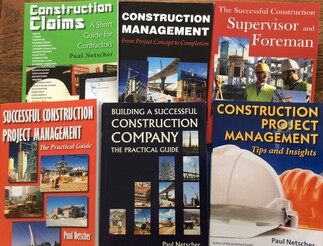 To read more about the author’s books and find out where you can purchase them visit the pages on this website by clicking the links below:
To read more about the author visit the page 'Paul Netscher' Want to contact Paul Netscher please enter your details on 'Contacts' Find out how Paul Netscher can help you 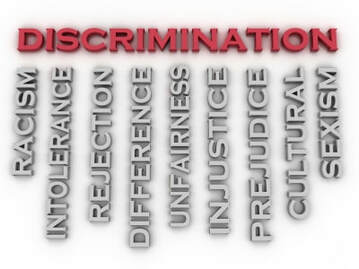 Image courtesy of David Castillo Dominici at FreeDigitalPhotos.net Image courtesy of David Castillo Dominici at FreeDigitalPhotos.net We often focus on the way people dress. Sure being dressed appropriately does show respect. But, does the way you dress really reflect the talents, skills and work ethics that you can bring to a company. There are even some who won’t offer a person a job because they have weird hairstyles, tattoos or dress differently. Indeed, I was surprised to hear a few years back that because I have a beard it was seen as reason not to promote me – now I know I have many shortcomings which could potentially be held against me, but I never considered having a beard was something that in anyway impacted the way I did my work! The other night I was watching a television program where a partially disabled person had been searching for a job for eight years. Another had been in prison and four years after being released nobody was prepared to offer her a job. They were desperate for a job. Was a partial disability, or a prison sentence enough to condemn them to never having a full time job? We all take our preconceptions with us. The way we were brought up, the environment we grew up in, our past experiences, and of course the people we associate with all contribute to the way we act and operate. We are all guilty of being racist to some degree. We often talk about people in terms of their nationality, country of origin, gender, colour or ethnicity. People in constructionIn construction we’re faced with a melting pot of people of different colours, from different nations, different cultures, varying economic backgrounds and with different levels of education. When we employ people on our construction projects, or promote people, or award salary increases or bonuses, how many of these decisions are made completely without bias or regard to the person’s appearance? It’s easy to get into the trap of certain nationalities being more suited to a specific job – a scaffolder, ironman or carpenter. Often these nationalities are given a label in jest, and we laugh, yet somewhere in the back of our mind this label often sticks. Unfortunately, we’re all often complicit to discrimination in some way, whether it’s overlooking lewd comments, ignoring jokes made at the expense of someone, or agreeing and accepting decisions made by others which we know are wrong. Why can’t we simply accept that we are all different, and that at the end of the day, having the right person for our construction projects and our company should be at the forefront of our decisions. Construction is a very gender biased industry, with few women. Somehow it’s just accepted that women aren’t suited. Why? I’ve probably been complicit in this with, I’m ashamed to say, few women employed on my projects. I was brought up in a country with legislated race segregation. This crippled the country and we had to import skilled construction people from other countries because a large section of our population wasn’t allowed to fill these positions. When things changed I was one of the first to provide equal opportunities to those working on my construction projects. If the person was willing to learn, I looked at their abilities and potential, not their skin colour or how they dressed. I was seldom disappointed, and I developed a loyal, skilled, hardworking team that contributed to my success, the project success and the success of our construction company. I’m sure deep down I’m racist in some ways, but when it comes to work, the best person always wins in my eyes, no matter where they’ve come from. Nevertheless I have probably on occasion made decisions based on the qualification the person presented, what they looked like and how they dressed. Managers sometimes base decisions on who gets promoted and when they get promoted ,on who will be offended by this promotion, rather than who is the best person for the job. In some cases, managers give jobs and promotions to family and friends, or promotions are given to people the manager likes, or a person who always agrees with them. Nepotism is a form of discrimination. Inevitably this results in poor people being elevated and good people leaving. Indeed, it never ceases to surprise me how people let their personal likes and dislikes, their personal petty attitudes, get in the way of making rational decisions in the best interests of the construction company and the project. If a person wants to work, why should we stand in their way? If the person is right for the position, why shouldn’t we promote them? It’s nonsensical to favour one person over another because of their background, appearance, colour, gender or nationality, rather than their skills and experience. It’s harmful to our construction project and company when we make decisions based on our perceptions of the person’s ability founded purely on their appearance, rather than on their actions, qualification and experience. Why pigeonhole somebody based on our expectations of that person because of their background and ethnicity, rather than finding out more about how they can contribute to our construction projects and company. How dare we make such assumptions without first giving them a chance to show their worth? Construction needs the best peopleConstruction is crying out for hard working, skilled workers. We cannot afford to turn away some based solely on their appearance, colour, nationality or religion. We cannot afford to hold people back for any reason other than their lack of performance or skills. We certainly shouldn’t be placing somebody in a role because we assume that’s where they fit. Nor should we allow others in the organisation to let their personal likes and dislikes negatively impact the project. It’s time to give people an opportunity to show their potential. We should never let our personal likes or dislikes impact the way we manage our construction projects. Is discrimination holding back your company? Are you promoting the best people, or do you let your personal likes and dislikes impact your judgement? This article was first published in an abbreviated form on the ClockShark website.
Please share this post To read more about the author’s books and find out where you can purchase them visit the pages on this website by clicking the links below:
To read more about the author visit the page 'Paul Netscher' Want to contact Paul Netscher please enter your details on 'Contacts' Find out how Paul Netscher can help you Are your construction project cost reports worth the paper they’re printed on? Image courtesy of stockimages at FreeDigitalPhotos.net Image courtesy of stockimages at FreeDigitalPhotos.net In a previous article, I discussed how important it is to know whether your construction project is making or losing money. Some contractors don’t bother with project cost reports. They simply hope for the best, and that the construction project ends profitably. While some contractors do sometimes prepare monthly project cost reports, unfortunately, these cost reports are of little value because they contain errors, or the information contained in them is ignored by the project team. 12 Common Cost Report MistakesCommon construction project cost reporting mistakes include:
Getting value from project costingsCost reports are only valuable if they are correct and if the information produced in the cost report is acted on by the project team. They should be easy to complete and simple to interpret so that project management time isn’t taken up preparing the report. It’s important to investigate anomalies in cost reports. Don’t just take the report at face value. I’ve discussed investigating your losses, but sometimes it’s equally important to investigate where you are making money. You don’t want to find later that where you thought you were profitable you actually aren’t, and there were in fact errors with your report. What mistakes have you encountered on construction project cost reports? #constructionfinances #constructionmanagement #contractors #constructionprofits This article was first published on the ClockShark website. Please share this post  To read more about the author’s books and find out where you can purchase them visit the pages on this website by clicking the links below:
To read more about the author visit the page 'Paul Netscher' Want to contact Paul Netscher please enter your details on 'Contacts' Find out how Paul Netscher can help you |
As an Amazon Associate I earn from qualifying purchases
Archives
January 2024
CategoriesCopyright 2016 - The attached articles cannot be reproduced for commercial purposes without the consent of the author.
The opinions expressed in the attached articles are those of the writer. It should be noted that projects are varied and different laws and restrictions apply which depend on the location of the contractor and the project. It's important that the reader uses the supplied information taking cognisance of their particular circumstances. The writer assumes no responsibility or liability for any loss of any kind arising from the reader using the information or advice contained herein. "I have what I consider some of the best books on construction management."
Books are available from: Amazon.com Amazon.co.uk takealot.com kalahari.com Amazon.in Amazon.de Amazon.fr Amazon.it Amazon.com.au Powell's Fishpond uread bokus Amazon.ca Amazon.es Other retail stores Available in paperback or on Kindle "28 YEARS OF CONSTRUCTION PROJECT MANAGEMENT EXPERIENCE, DEVELOPING SUCCESSFUL CONSTRUCTION PROJECT MANAGERS AND BUILDING SUCCESSFUL CONSTRUCTION COMPANIES"
|
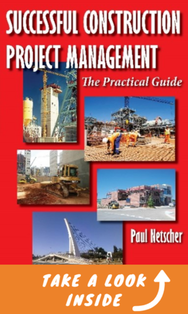

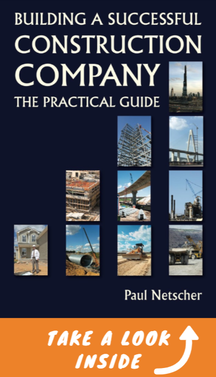
 RSS Feed
RSS Feed